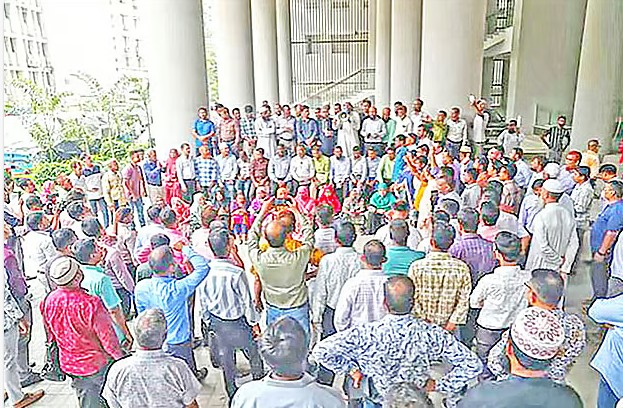The fourth chapter of the report by the public administration reform commission, formed under the interim government, lists several recommendations regarding reforms in behavior and mindset of public administration employees. The commission believes that, in addition to assisting in achieving the government’s policy objectives, it is necessary to ensure certain fundamental professional values among public servants to uphold democratic values.
To this end, the commission has recommended a civil service code which includes these fundamental values. The values mentioned in the recommendations are: people-centric values, accountability, transparency, integrity, leadership and innovation, equity, and professionalism.
It is unclear whether the interim government is formulating a civil service code in accordance with this recommendation. However, the government recently amended the Public Service Act, 2018 and issued the Public Service (Amendment) Ordinance, 2025, which emphasizes ensuring the loyalty of public servants.
There remain questions about how consistent this amendment is with the core perspective of the reform commission. While the commission emphasizes accountability and transparency, the new ordinance has defined a vague and undefined concept of ‘disloyalty’ as a punishable offence.
The special provision regarding the conduct and punishment of government employees in the ordinance states that if any government employee engages in actions that amount to insubordination, incite insubordination among other employees, disrupt discipline, or hinder work, such behavior will be considered misconduct.
For such offences, penalties may include demotion in position or pay grade, dismissal from service, or even termination. Government employees fear that, due to this ordinance, they may be forced to comply with unjust orders from senior officials. If they refuse, they risk losing their jobs. In protest, they have taken to the streets demanding the repeal of the ordinance. In response to the protests, the government has recently formed a high-level committee to review the ordinance.
As things are, if government employees disobey orders, engage in corruption, or neglect their duties, they can be punished under existing laws and regulations. The real issue lies in the proper enforcement and the pace of implementation of these laws and rules.
It is unclear how issuing a new ordinance that includes punishment for an undefined and vague concept like “insubordination” will help resolve the existing problems. What is truly needed is transparency and accountability to ensure that government employees deliver public services promptly without resorting to bribery or corruption. In that context, the necessity for blind obedience is hard to comprehend.
The government-appointed public reform commission made several important recommendations to address irregularities, corruption, and negligence among public servants. However, even in those recommendations, there was no proposal to enact laws allowing dismissal from service solely on the grounds of insubordination.
According to the existing Government Employees (Discipline and Appeal) Rules, 2018, one of the grounds for imposing serious penalties, ranging from temporary suspension to dismissal, is “misconduct.” The rules define “misconduct” as:
1. Disobeying a lawful order from a superior officer;
2. Negligence in duty;
3. Disregarding government orders, circulars, or instructions without lawful cause;
4. Filing baseless, unfounded, harassing, false, or trivial complaints against another public servant to the authorities; and 5. Engaging in acts considered misconduct under any other law or regulation.
What citizens expect from the civil service is that it operates impartially, without political bias, and delivers timely services without bribes.
Under the existing rules, not just any disobedience of a superior’s order is punishable, but only disobedience of a lawful order is considered an offence. However, in the new ordinance, “insubordination” has been declared a punishable offence. Yet the term itself remains undefined. It does not clarify what constitutes insubordination or to whom it applies, whether to the government, the state, or a superior officer.
Whereas the previous regulations clearly referred to disobedience of lawful orders, the new ordinance includes no such qualification. As a result, the vague and undefined provision of “insubordination” could be used by the government or senior officials to compel subordinates to carry out any directive, regardless of its legality.
From the perspective of government officials, this opens the door to using the insubordination clause as a shield to justify serious wrongdoing. For instance, if officials participate in electoral fraud, they could evade responsibility by claiming they were simply following orders out of loyalty. In contrast, under the existing rules, since the definition of misconduct includes only the disobedience of lawful orders, no such excuse could be used to justify participation in unlawful activities like vote rigging.
Moreover, two crucial steps in the disciplinary process, that is, investigation and consultation with the Public Service Commission, have been removed in the new ordinance. Previously, disciplinary action required both an investigation and the commission’s opinion, but the new rules eliminate this requirement, increasing the risk of abuse of power. While skipping the commission’s review may be justified to reduce delays, the absence of an investigative process means that a senior official in any department could dismiss a subordinate out of political motive or personal hostility.
If necessary, the Government Servants (Discipline and Appeal) Rules, 2018 could be amended to shorten the timelines for issuing show-cause notices, responses, hearings, and investigations. But eliminating these procedural safeguards and introducing punishment for an undefined act like “insubordination” is not justified.
What citizens expect from the civil service is that it operates impartially, without political bias, and delivers timely services without bribes. Therefore, the government should focus on quickly implementing the recommendations of the public administration reform commission that aim to ensure timely, corruption-free public service and uphold the neutrality of the civil administration.
To ensure timely service delivery without bribes, the commission has recommended setting service standards, launching online tracking, simplifying procedures, introducing a token-based system, adhering to service timelines, and evaluating staff performance, among other measures. Additionally, following the establishment of an Ombudsman office, it has been proposed that ministries and other departments implement mechanisms for complaint resolution. The recommendations also include gathering community-based feedback, assessing service satisfaction, and providing compensation for harassment faced by service seekers.
The introduction of Key Performance Indicators (KPIs) and replacing the Annual Confidential Report (ACR) with an Annual Performance Evaluation (APE) has been proposed to evaluate the performance of government employees. Employees will submit a work plan at the beginning of the year, and their performance will be evaluated at the end. Financial benefits, training opportunities, and other facilities will be tied to performance.
To ensure neutrality in public administration, the commission’s recommendations include eliminating political background checks in promotions, verifying only criminal cases before recruitment, prohibiting participation in political programmes, appointing personal secretaries to ministers/state ministers from outside the civil service, defining limits on the interference of elected representatives, and prohibiting changes to decisions without written instructions.
Over the past 53 years, 26 commissions and committees have been formed for administrative reforms in the country. Their recommendations were not implemented due to political unwillingness and conflicting interests among bureaucrats. To avoid a repeat of this, the government must proceed decisively, taking all aspects into consideration. Weak and undemocratic measures must be avoided, and public opinion in favour of reform must be built through dialogue with stakeholders.
The people want an efficient, professional, and accountable administration. For that, what is needed is not blind loyalty, but integrity, competence, and commitment to public service.
* Kallol Mustafa is a writer on power, energy, environment, and development economics. He can be reached at: kallol_mustafa@yahoo.com
* The views expressed are the author’s own.
Source Courtesy: prothomalo.com





